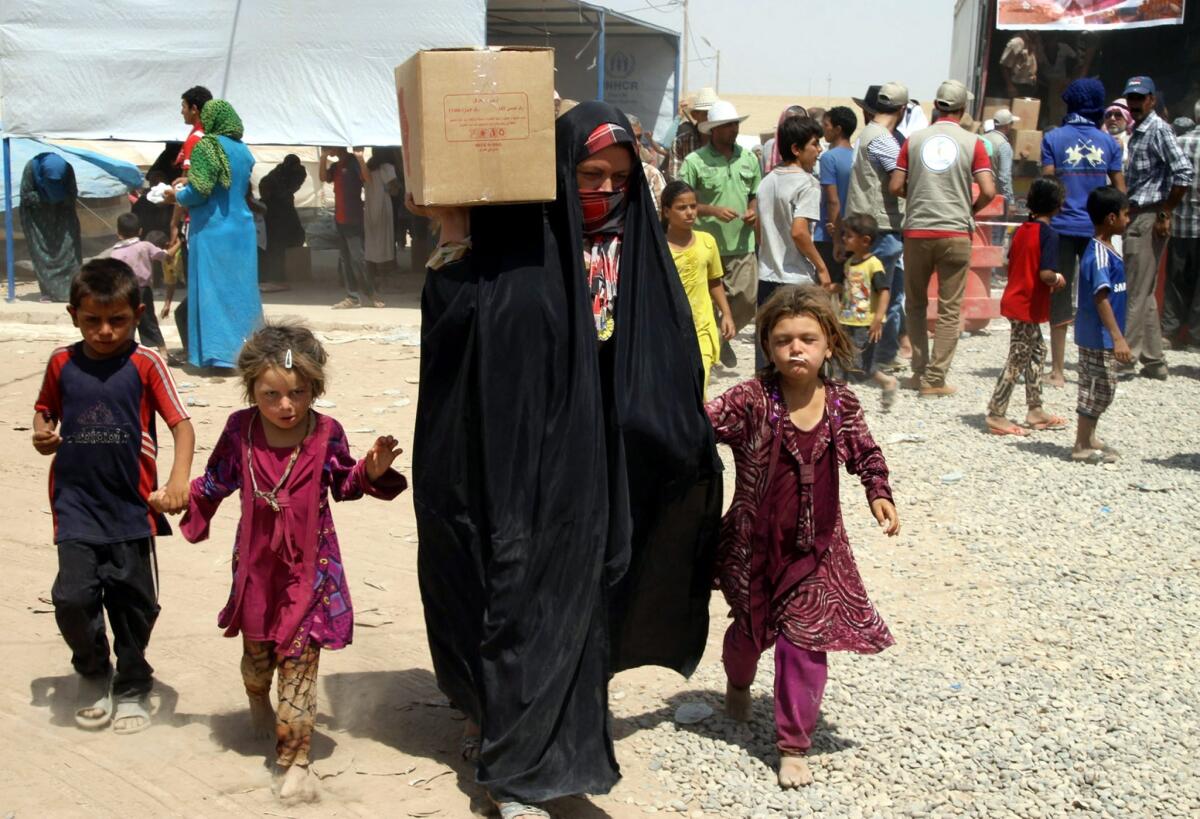Iraqi government offers Kurds air support against militants

The Iraqi government said Monday it would offer air support to Kurdish forces fighting to push back Islamist rebels who in recent days have seized new swaths of territory in northern Iraq.
The United Nations has warned of a humanitarian tragedy as tens of thousands of civilians flee the latest advances by forces allied with the Islamic State, an Al Qaeda breakaway faction.
So-called peshmerga fighters from Iraq’s semi-autonomous Kurdish region have reportedly launched a counter-offensive in the vicinity of the town of Sinjar, west of Mosul in northwestern Iraq. The town was overrun in recent days by fighters allied with the Islamic State, which in June captured vast expanses of northern Iraq, including Mosul, Iraq’s second-largest city.
The new Islamic State thrust drove out Kurdish forces who moved into the area in June after the Iraqi military retreated south, leaving a security vacuum. The disputed zone is close to Iraq’s semi-autonomous Kurdish region.
On Monday, Qassem Atta, spokesman for the Iraqi army in Baghdad, said in a statement that Prime Minister Nouri Maliki had ordered the nation’s armed forces to provide air support to Kurdish units against “the terrorist gangs.” The Iraqi central government routinely calls the Islamist rebels terrorists.
Iraq has limited air assets and it was unclear how much of a difference air support could make across what is a sprawling battlefield. Iraqi warplanes have already been reportedly bombing Islamic State positions in Mosul and elsewhere.
But the offer of aerial assistance did seem to signal the possibility of a new cooperation between central government forces and Kurdish units.
Relations have become extremely strained between Baghdad and Iraq’s Kurdistan Regional Government. Iraqi officials in Baghdad have alleged that independence-minded Kurdish officials have made a grab for oil-rich northern lands in the wake of the Islamic State’s onslaught, and even collaborated with militant forces -- an allegation denied by the secular Kurdish government.
On Monday, Kurdish media reported that peshmerga forces had launched a counter-offensive on Sinjar, which is along the route to the Syrian border from Mosul. Fierce fighting was ongoing as Kurdish troops and heavy armor were dispatched to the area, according to Kurdish media accounts.
The latest militant advances have forced tens of thousands of civilians to flee. Many of them are from the Yazidi minority, who follow a pre-Islamic faith linked to Zoroastrian beliefs. Tens of thousands of Yazidis and others have fled toward Kurdish-controlled territory. Sinjar and its environs in the so-called Nineveh plains had previously provided shelter for vulnerable ethnic or religious groups.
“A humanitarian tragedy is unfolding in Sinjar,” Nickolay Mladenov, the top U.N. official in Iraq, said in a statement on Sunday, citing an urgent need for food, water and medicine.
The Islamic State views as “infidels” both Yazidis and Shiite Muslims, who have also fled in huge numbers as the jihadists and their allies continue their onslaught. There have been reports of executions of Yazidis and Shiites and destruction of their places of worship.
Thousands of Christians have also fled the area in the wake of the Islamic State advance and its capture in June of Mosul, long a hub of Christianity.
Territorial gains by the militants after weeks of a relatively stable front line in northwest Iraq raise questions about how long Kurdish forces can hold off Islamic State and allied fighters.
Many Sunni Muslims tribal groups and other Sunnis disaffected with the Shiite-dominated central government in Baghdad have formed alliances with the Islamic State, bolstering jihadist strength. The Islamic State has vowed to march on to Baghdad, though the capital remains firmly in the hands of the central government and is heavily defended by the Iraqi military and allied Shiite militiamen.
In their latest offensive, Islamic State forces have also overrun several small oil fields in northwest Iraq and threatened the Mosul dam, a major water source. But Kurdish authorities say their forces still control the strategic dam. The jihadists, whose conquered territory stretches deep into neighboring Syria, have been seizing oil and gas fields in Iraq and Syria and reportedly selling oil on the black market.
Twitter: @mcdneville
More to Read
Start your day right
Sign up for Essential California for news, features and recommendations from the L.A. Times and beyond in your inbox six days a week.
You may occasionally receive promotional content from the Los Angeles Times.






